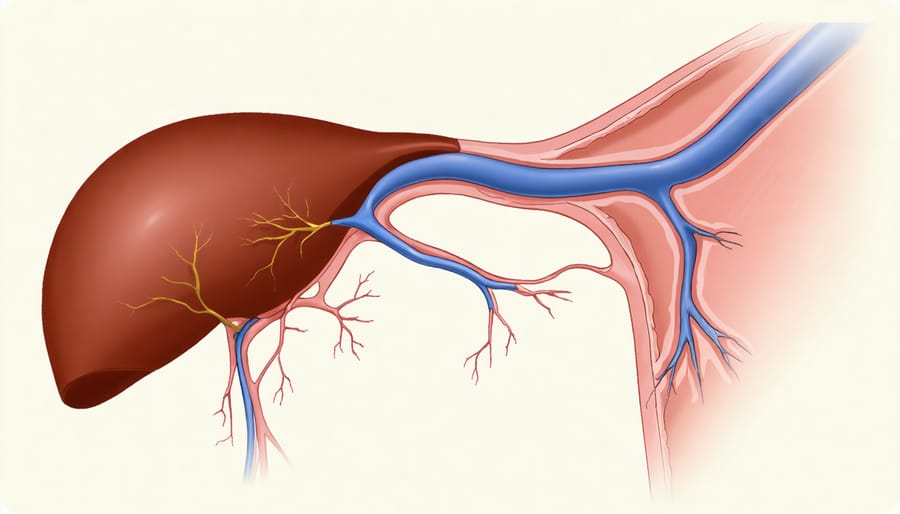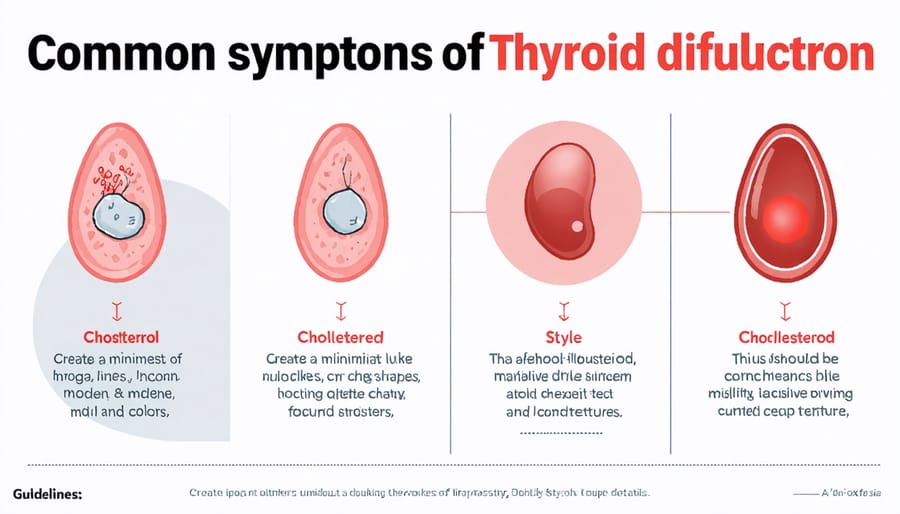The intricate relationship between thyroid hormones and cholesterol plays a crucial role in your overall health, affecting everything from your metabolism to your heart health. When thyroid function becomes imbalanced, it can significantly impact how your body processes and manages cholesterol levels – a key factor in developing hormone imbalances and chronic disease. Understanding this connection empowers you to take control of both your thyroid and cardiovascular health.
Recent research shows that even slight changes in thyroid hormone levels can affect how efficiently your body manages cholesterol, potentially leading to elevated levels that impact your heart health. Whether you’re managing existing thyroid conditions or simply wanting to maintain optimal health, recognizing the signs of thyroid-related cholesterol issues and knowing how to address them can make a significant difference in your well-being.
The Thyroid-Cholesterol Connection

How Thyroid Hormones Regulate Cholesterol
Your thyroid hormones play a crucial role in managing your body’s cholesterol levels through several important processes. Think of thyroid hormones as the conductors of an orchestra, coordinating different players to maintain healthy cholesterol balance.
First, thyroid hormones help your liver cells remove excess cholesterol from your blood. They do this by increasing the number of receptors that catch and clear away LDL (often called “bad”) cholesterol. When your thyroid is working properly, this cleanup system runs smoothly.
These hormones also help your body break down cholesterol more effectively. They boost the activity of specific enzymes that process cholesterol and turn it into other substances your body needs. Additionally, thyroid hormones influence how quickly your body processes and removes all types of fats, including cholesterol.
Another important way thyroid hormones affect cholesterol is through metabolism. When thyroid levels are normal, your metabolism runs efficiently, helping maintain healthy cholesterol levels. However, if your thyroid becomes underactive (hypothyroidism), this process slows down, which can lead to higher cholesterol levels.
For Albertans who spend more time indoors during our long winters, maintaining good thyroid health is especially important, as this can affect both thyroid function and cholesterol levels. Regular check-ups with your healthcare provider can help ensure your thyroid is working effectively to manage your cholesterol.
Signs Your Thyroid Might Be Affecting Your Cholesterol
If you’re wondering whether your thyroid might be affecting your cholesterol levels, there are several signs to watch for. Many Albertans experience these symptoms without realizing they could be thyroid-related.
First, check if you’re experiencing unexplained weight changes, particularly weight gain that’s resistant to diet and exercise. This could indicate an underactive thyroid, which often leads to higher cholesterol levels.
Feeling unusually tired or sluggish, even after a good night’s sleep, is another common sign. This fatigue often goes hand-in-hand with both thyroid issues and cholesterol problems. You might also notice you’re more sensitive to cold temperatures than others around you.
Pay attention to changes in your skin and hair. Dry, flaky skin and brittle hair can signal thyroid dysfunction. Some people also experience muscle aches, joint pain, or weakness, especially in their arms and legs.
Mental symptoms matter too. If you’re experiencing brain fog, difficulty concentrating, or mood changes alongside your cholesterol concerns, your thyroid might be the underlying cause.
Remember, these symptoms can be subtle and develop gradually. If you notice several of these signs, especially if you’ve recently had unusual cholesterol test results, it’s worth discussing with your healthcare provider. They can perform simple blood tests to check both your thyroid function and cholesterol levels.

Understanding Your Numbers
Key Tests to Discuss With Your Doctor
Regular testing is key to understanding how your thyroid and cholesterol levels are working together. When visiting your doctor, ask about these important tests:
TSH (Thyroid Stimulating Hormone): This is the main test for thyroid function. Most Alberta healthcare providers recommend checking TSH levels every 1-2 years, or more frequently if you have thyroid issues.
Free T4 and Free T3: These tests measure your actual thyroid hormone levels and are often ordered alongside TSH to get a complete picture of thyroid function.
Lipid Panel: This test checks your cholesterol levels, including:
– Total cholesterol
– LDL (often called “bad” cholesterol)
– HDL (known as “good” cholesterol)
– Triglycerides
Your doctor might recommend getting these tests done at any Alberta lab location. For most adults, cholesterol screening should happen every 4-6 years, but more often if you have risk factors or thyroid conditions.
Remember to fast for 8-12 hours before your lipid panel test for the most accurate results. Keep a record of your test results to track changes over time and discuss any concerns with your healthcare provider.
Taking Action: Practical Steps for Albertans
Diet and Lifestyle Changes That Support Both Systems
Making healthy lifestyle changes can positively impact both your thyroid function and cholesterol levels. Understanding how your food choices affect hormone health is crucial for maintaining balance in both systems.
Start by incorporating selenium-rich foods like Brazil nuts, eggs, and fish into your diet. These foods support healthy thyroid function while providing heart-healthy nutrients. Adding fiber-rich foods like oats, lentils, and leafy greens helps manage cholesterol levels naturally.
Regular exercise is equally important – aim for 30 minutes of moderate activity most days of the week. Here in Alberta, try activities like walking the River Valley trails or cycling through local parks. Managing stress through activities like yoga or meditation can also help regulate both systems.
Ensure you’re getting enough sleep (7-9 hours nightly) and stay hydrated by drinking plenty of water throughout the day. Limit processed foods and excess sugar, which can interfere with both thyroid function and cholesterol levels. Remember to discuss any dietary changes with your healthcare provider, especially if you’re taking thyroid medication.

Understanding the connection between thyroid hormones and cholesterol is crucial for your overall health. As we’ve explored, these two systems work closely together, and maintaining balance is key to feeling your best. Remember that changes in your thyroid function can significantly impact your cholesterol levels, and vice versa.
Don’t wait for problems to develop – take charge of your health today. Schedule regular check-ups with your healthcare provider, maintain a balanced diet rich in nutrients, and stay physically active. If you’re concerned about your thyroid or cholesterol levels, speak with your doctor about getting tested.
For Albertans, many local health centers offer comprehensive screening programs. Small lifestyle changes, like incorporating more whole foods and regular exercise, can make a big difference in managing both your thyroid and cholesterol levels. Your health is in your hands, and with the right knowledge and support, you can work towards optimal hormone and heart health.

